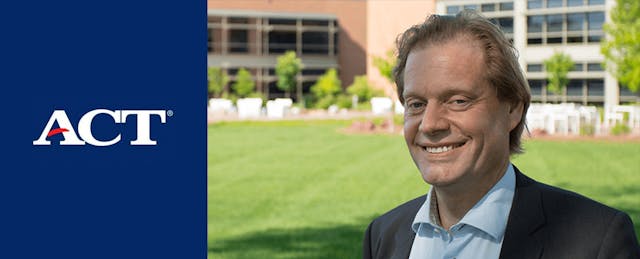Marten Roorda, who for the past four-and-a-half years has presided as CEO of ACT, the nonprofit best known for its college-admissions test by the same name, is leaving the organization.
Roorda took the helm at ACT in October 2015, replacing its previous CEO Jon Whitemore. Under his watch, the Iowa City, Iowa-based nonprofit invested heavily in education technology companies to expand its services beyond test prep.
Like its main competitor College Board, which administers the SAT, ACT has been trying to diversify its offerings by taking a more “holistic” approach to supporting students. That means going beyond high-stakes assessment to providing services to support social-emotional wellbeing and career-navigation skills. These efforts have often entailed incorporating research about learning sciences into new offerings.
Since Roorda took over, ACT has acquired organizations offering a variety of resources, from social-emotional learning to college-readiness tools and open educational resources. Its most recent purchase, ScootPad, offers an online instructional platform for K-8 math and English subjects. The group also invested in startups building assessment and adaptive learning technologies, and invested $10.5 million in New Markets Venture Partners, an education technology venture investment firm.
According to its website, Janet Godwin is currently in charge as interim CEO. She is a veteran, having joined ACT in 1990 and served as its chief operating officer since August 2014.
“Marten helped establish a transformative strategy that’s helping us move forward in new areas of navigating learning and measurements,” says Godwin in an interview with EdSurge. She says ACT will continue its efforts to support students and teachers in earlier grades through new tools that can diagnose and predict their needs, and direct them to the appropriate resources. Godwin did not comment on what led to Roorda’s departure.
Godwin says that ACT is unlikely to pursue further investments or purchases for the time being. “We’ve acquired the capabilities that we need. We’re not anticipating more acquisition at this point,” she says. The focus is to integrate the different technology assets it purchased and use them to build new tools and services.
Roorda’s departure was part of an announcement from ACT today that included details around cost-cutting measures. Among them are reducing testing center capacity, pausing pay raises for employees and reducing “fringe benefits.” There are also “voluntary options for its team members to reduce their work hours, take leaves of absence, or voluntarily resign and receive severance pay.”
Godwin says there have been no involuntary layoffs or furloughs at the moment. However, the ACT statement noted that “further cost reductions are expected.” According to Godwin, the organization currently has about 1,100 employees.
These developments come at a time when more colleges and universities are backing away from using the ACT and SAT as a precondition for admissions. One of the biggest blows came earlier this week, when the University of California voted to eliminate those testing requirements for California students by 2025.
The pandemic has also forced ACT to postpone and and cancel its tests, which drive a significant chunk of its revenue. According to its 2018 tax filing, “educational assessments” generated about $305 million out of its total $353 million in revenue that year.


